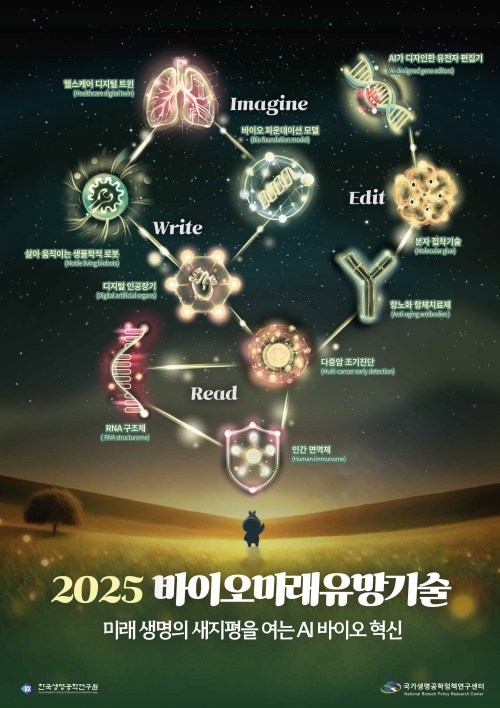Information Center
- Main page
- Information Center
- Government News
Government News
- Source
- KOREA.net
- Date
- 2025.01.22

This is an infographic for this year's top 10 promising future biotechnologies. (Ministry of Science and ICT)
By Kim Hyelin
The human immune system, gene editors designed by artificial intelligence (AI), living biological robots and bio foundation models are among this year's top 10 promising future biotechnologies.
The Ministry of Science and ICT and Korea Research Institute of Bioscience and Biotechnology (KRIBB) on Jan. 20 announced the list for 2025.
A promising future biotechnology is expected to be technically or commercially feasible within the next five to 10 years and have ripple effects in other sectors as well as bio.
Since 2015, the ministry and KRIBB have found such technologies in cutting-edge bio, which is considered one of the three main game-changing technical sectors.
Both sides said future bio-research systems will change from repeated experiments and observations to data-based projections and hypotheses via convergence with AI.
A vast trove of data is generated by going beyond reading (observance and analysis) biological phenomena as is in each field of editing (editing and reprogramming); writing (stimulation and synthesis) of useful functions; and imagining (prediction and simulation).
Such information will be connected organically via AI, which will innovatively reduce and speed up the discovery and development cycles.
Human immunity, an observance and analysis sector, will lead to the launch of a global immunity database based on high-resolution assessment technology and an AI model of the human immunity system.
To raise its application potential, the editing sector will design gene editors of high efficiency and safety based on AI.
Moving robots are seen to have their applications expanded to biomedicine like cleaning arteries or delivery drugs through self-navigating tissue precursor cells or space exploration.
The bio-foundation model, which predicts new principles through massive bio data learning, is expected to emerge as a core technology, with global chip giant Nvidia to launch the generative AI BioNemo early this year.
"Breakthroughs in biotech have opened the way to the previously inaccessible continent of new knowledge in the realm of complex bio phenomena," said Deputy Minister of Science and ICT Hwang Pan-Sik, who heads the ministry's Office of Research and Development Policy. "This will also stimulate investment."
kimhyelin211@korea.kr